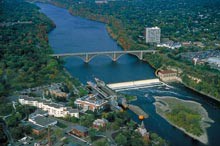 The hand of humankind is much in evidence on the Mississippi, and we've left plenty of fingerprints over the last 150 years. Humans have been impacting the river far longer than the recent past. The Mississippi was the primary transportation and trade route into and through the central part of the continent. People drank its water and sent their wastes downstream, as they continue to do today. People harvested the plants and animals that were abundant in the river valley. But until the advent of serious European settlement, there weren't enough people in the region to seriously affect the river. And with large numbers of European settlers came the need for reliability: a reliable source of drinking water, reliable water levels for transportation, reliable flows for flushing away waste, etc. Within recent years, human induced climate change has been affecting the river. More frequent storms and dry spells are affecting the river's flow, and warmer temperatures are leaving it unfrozen longer. This not only affects the wildlife, but the humans living near the river as well. As people creep closer to the river's edge and make more demands on the river, the increasing flood and drought cycles are having greater human impacts. |
Last updated: September 28, 2015
